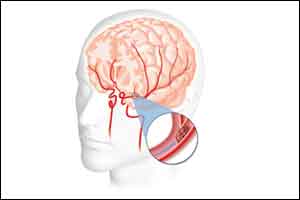- Home
- Editorial
- News
- Practice Guidelines
- Anesthesiology Guidelines
- Cancer Guidelines
- Cardiac Sciences Guidelines
- Critical Care Guidelines
- Dentistry Guidelines
- Dermatology Guidelines
- Diabetes and Endo Guidelines
- Diagnostics Guidelines
- ENT Guidelines
- Featured Practice Guidelines
- Gastroenterology Guidelines
- Geriatrics Guidelines
- Medicine Guidelines
- Nephrology Guidelines
- Neurosciences Guidelines
- Obs and Gynae Guidelines
- Ophthalmology Guidelines
- Orthopaedics Guidelines
- Paediatrics Guidelines
- Psychiatry Guidelines
- Pulmonology Guidelines
- Radiology Guidelines
- Surgery Guidelines
- Urology Guidelines
Cilostazol bests aspirin for stroke patients at high-risk for cerebral hemorrhage

Korea: Cilostazol is more beneficial than aspirin for ischemic stroke patients with multiple cerebral microbleeds (intracerebral hemorrhage) and mild to moderate white matter changes, suggests a recent study published in the AHA journal Stroke.
Previous studies have shown cilostazol to be associated with fewer hemorrhagic events than aspirin but only marginal difference were observed in hemorrhagic stroke events among patients at high risk for cerebral hemorrhage. To identify patients who would most benefit from cilostazol, Sun U. Kwon, University of Ulsan, College of Medicine, Seoul, Korea, and colleagues analyzed interactions between treatment and subgroups of the PICASSO trial (Prevention of Cardiovascular Events in Asian Ischemic Stroke Patients With High Risk of Cerebral Hemorrhage).
The study enrolled 1534 ischemic stroke patients with a previous intracerebral hemorrhage or multiple microbleeds. They were randomized to treatment with cilostazol or aspirin and followed up for a mean of 1.8 years. Efficacy, defined as the composite of any stroke, myocardial infarction, and vascular death, and safety, defined as the incidence of hemorrhagic stroke, were analyzed in the 2 groups. Interactions between treatment and age, sex, presence of hypertension and diabetes mellitus, index of a high-risk cerebral hemorrhage, and white matter lesion burden were analyzed for primary and key secondary outcomes. Changes in vital signs and laboratory results were compared in the 2 groups.
Read Also: Cilostazol better than aspirin in reducing recurrence of ischemic stroke
Key findings include:
- A significant interaction between the treatment group and index of high risk for cerebral hemorrhage on hemorrhagic stroke was observed.
- Hemorrhagic stroke was less frequent in the cilostazol than in the aspirin group in patients with multiple microbleeds (1 versus 13 events; hazard ratio, 0.08).
- A marginal interaction between the treatment group and white matter change on any stroke was observed.
- Cilostazol reduced any stroke significantly in patients with mild (5 versus 16 events; hazard ratio, to-moderate (16 versus 32 events; hazard ratio, 0.50) white matter changes.
- Heart rate and HDL (high-density lipoprotein) cholesterol levels were significantly higher in the cilostazol group than in the aspirin group at follow-up.
Read Also: Drugs to prevent stroke and dementia show promise in early trial
"Cilostazol may be more beneficial for ischemic stroke patients with multiple cerebral microbleeds and before white matter changes are extensive," concluded the authors.
The study, "Cilostazol Versus Aspirin in Ischemic Stroke Patients With High-Risk Cerebral Hemorrhage," is published in the AHA journal Stroke.

Disclaimer: This site is primarily intended for healthcare professionals. Any content/information on this website does not replace the advice of medical and/or health professionals and should not be construed as medical/diagnostic advice/endorsement or prescription. Use of this site is subject to our terms of use, privacy policy, advertisement policy. © 2020 Minerva Medical Treatment Pvt Ltd